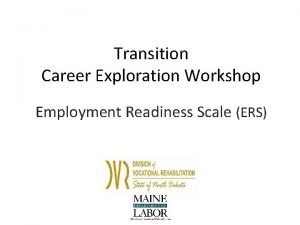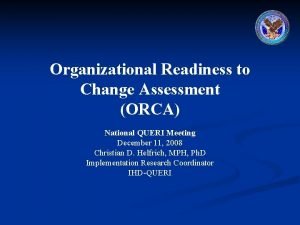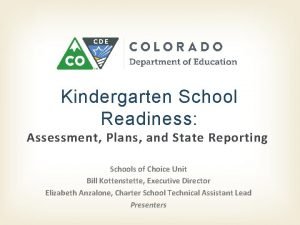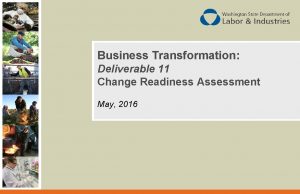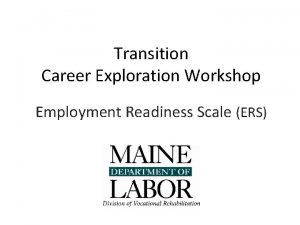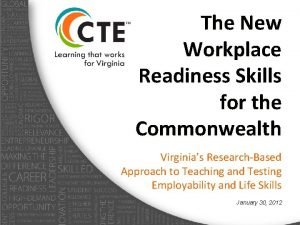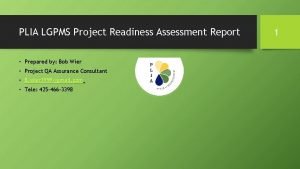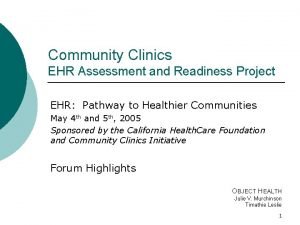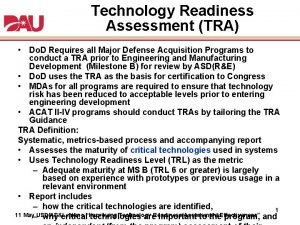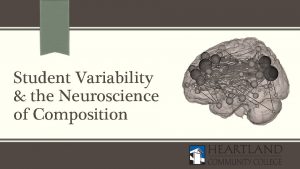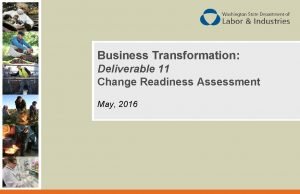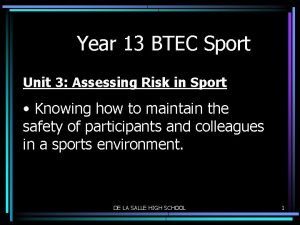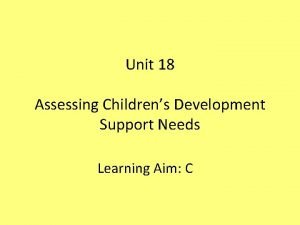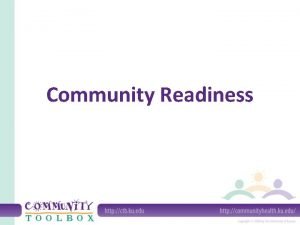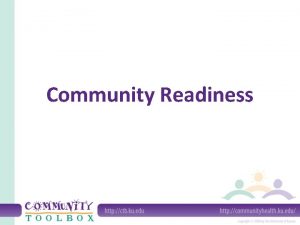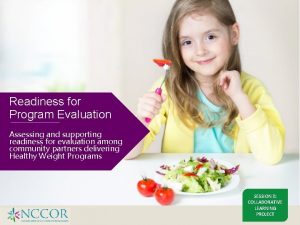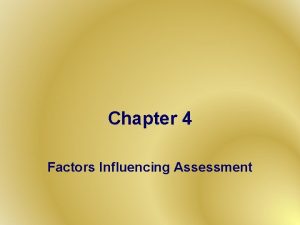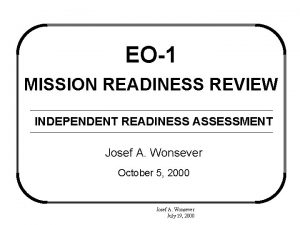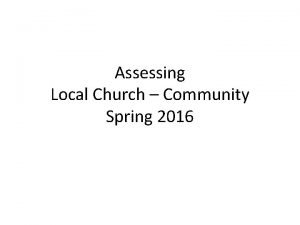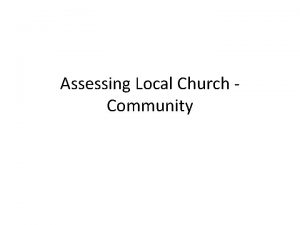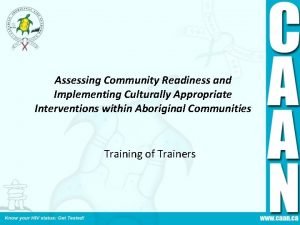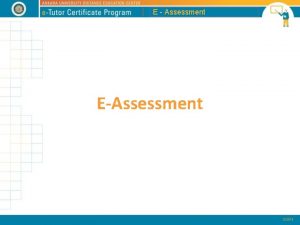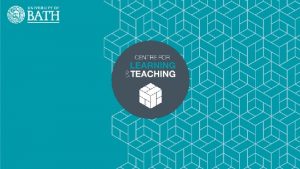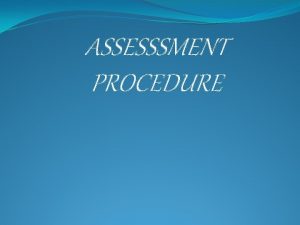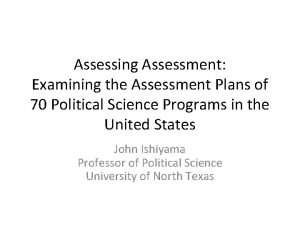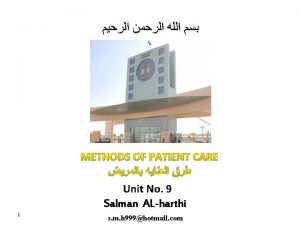Community Readiness Assessment Assessing Community Readiness is the



















- Slides: 19

Community Readiness Assessment

Assessing Community Readiness is the degree to which a community is prepared to take action on an issue. It is an essential piece in creating community change

The Tri-Ethnic Community Readiness Model Tri-Ethnic Center for Prevention Research Sage Hall, Colorado State University www. Tri. Ethnic. Center. Colo. State. edu Barbara A. Plested Ruth W. Edwards Pamela Jumper-Thurman

Community Readiness o. Assessing community readiness for change o. Increasing community capacity o. Creating a climate that makes change possible

Dimensions of Readiness A. B. C. D. E. F. Community Efforts Community Knowledge of the Efforts Leadership Community Climate Community Knowledge about the Issue Resources Related to the Issue

Stages of Readiness 9. High Level of Community Ownership 8. Confirmation/Expansion 7. Stabilization 6. Initiation 5. Preparation 4. Preplanning 3. Vague Awareness 2. Denial 1. No Awareness

• Define “Community” • Conduct Key Respondent Interviews • Score to determine readiness level • Develop readiness strategies • COMMUNITY CHANGE!

Assessing Readiness o Identify Key Respondents o Conduct Interviews o Score Interviews o Interpret, Report and Share Results

Who is interviewed? Minimum of 6 individuals, 26 questions, 30 -60 minute interviews Schools/ Universities Social Services Spiritual/ Religious City/County Government Health/Medical Professionals Mental Health Services Law Enforcement/ Probation Youth Community At Large

Cultural Competence and Assessment o Involving representatives across sectors o Collecting Information in Appropriate Ways o Looking in your own backyard

Conduct Key Respondent Interviews o Things to consider: o Who will conduct them o Where/how will they be conducted o How will answers be captured

Scoring o Identify two scorers o Each works independently to score dimensions o Then meet to reach consensus on scores o Calculate overall stage of readiness o Highlight impressions, unique outcomes and qualifying statements

Matching Strategies to Readiness o Using this model to meet the community where they are at o Finding a place to start o Whose readiness do we need to raise?

Goals and Strategies for Each Stage o 1. No Awareness o Goal: Begin to raise awareness of the issue o 2. Denial/Resistance o Goal: Raise awareness that the problem or issue exists in this community. o 3. Vague Awareness o Goal: Raise awareness that the community can do something

Goals and Strategies for Each Stage o 4. Preplanning o Goal: Raise awareness with concrete ideas o 5. Preparation o Goal: Gather existing information with which to plan more specific strategies o 6. Initiation o Goal: Provide community specific information

Goals and Strategies for Each Stage o 7. Stabilization o Goal: Stabilize efforts and programs o 8. Confirmation o Goal: Enhance and expand services o 9. High Level of Community Ownership o Goal: Maintain momentum and continue growth

Additional Resources www. iowaspfsig. org ØSPF Resources ØAssessment Deliverables

Discussion What does readiness mean to you? How could this tool benefit your project? What resources would you need to carry out a community readiness assessment? What will your next step be?

This project is funded by Iowa Department of Public Health, through the Substance Abuse and Mental Health Services Administration (SAMHSA) of the U. S. Department of Health and Human Services.
 Employment readiness scale
Employment readiness scale Organizational readiness to change assessment (orca)
Organizational readiness to change assessment (orca) Colorado kindergarten readiness assessment
Colorado kindergarten readiness assessment Cloud readiness assessment report
Cloud readiness assessment report Business transformation readiness assessment
Business transformation readiness assessment Employment readiness scale assessment
Employment readiness scale assessment Workplace readiness assessment
Workplace readiness assessment Tasc readiness assessment
Tasc readiness assessment Project readiness assessment
Project readiness assessment Manufacturing readiness assessment
Manufacturing readiness assessment Ipo readiness assessment
Ipo readiness assessment Ehr readiness assessment
Ehr readiness assessment Technology readiness assessment template
Technology readiness assessment template Landmark college readiness assessment
Landmark college readiness assessment Career readiness self assessment
Career readiness self assessment Business transformation readiness assessment
Business transformation readiness assessment Win career readiness
Win career readiness Assessing risk in sport regulatory bodies
Assessing risk in sport regulatory bodies Unit 18 assessing children's development support needs p1
Unit 18 assessing children's development support needs p1 Teaching and assessing grammar in the writing classroom
Teaching and assessing grammar in the writing classroom
